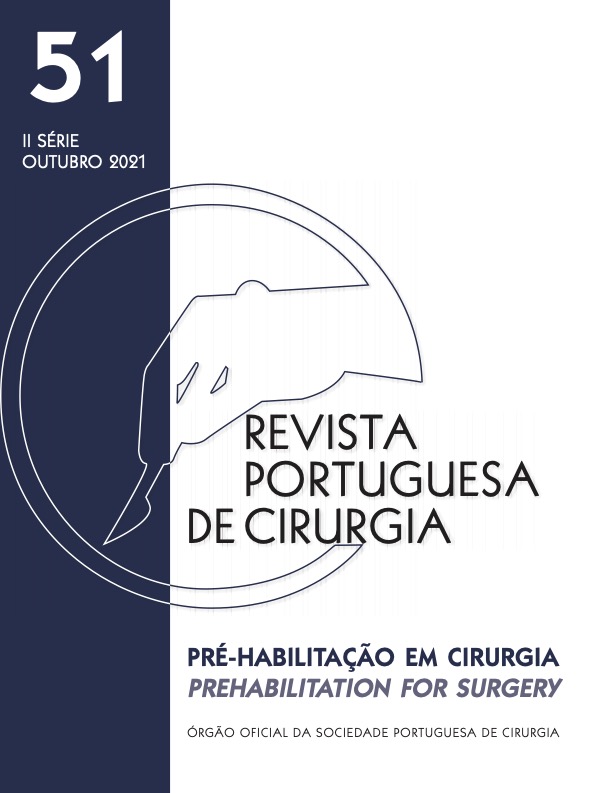POST-OPERATIVE COMPLICATIONS IN RISK SURGICAL PATIENTS ADMITTED TO THE INTERMEDIATE CARE UNIT OF PORTUGUESE INSTITUTE OF ONCOLOGY, PORTO: RELEVANT INFORMATION TO PLAN A PATIENT CENTERED CARE
DOI:
https://doi.org/10.34635/rpc.939Keywords:
Surgical patients at risk, surgical intermediate care unit, perioperative careAbstract
Knowing the surgical burden and risk profile of surgical complications is mandatory to support the effective organization of perioperative care. The purpose of this work was to characterize the complication’s profile of patients admitted and treated in the years 2017 and 2018 in the surgical intermediate care unit (SICU) at our institution. The clinical records of surgical patients admitted to the intermediate surgery care unit (n=2017) with a high risk of complications were retrospectively studied, considering the comorbidities and surgical complexities. In this group of patients, 832 postoperative complications occurred. Most were grade I and II according to the Clavien-Dindo classification. Respiratory, sepsis and cardiac complications were the most prevalent medical major complications. Surgical site infections, anastomosis leak and peritonitis were the most prevalent surgical complications, 2.2% of patients died in this series. These data point out the need of an organized and resourceful perioperative care program that includes a prehabilitation program, proficient intraoperative care and a multidisciplinary team in the SICU to ensure quality post-operative care, for high-risk surgical patient.
Downloads
References
2 Iversen, L.H., et al., The Impact of Comorbidity on Survival of Danish Colorectal Cancer Patients from 1995 to 2006 – A Population- Based Cohort Study. Diseases of the Colon & Rectum, 2009. 52(1): p. 71-78.
3 Lemmens, V.E., et al., Comorbidity leads to altered treatment and worse survival of elderly patients with colorectal cancer. Br J Surg, 2005. 92(5): p. 615-23.
4 Fernandes A, Rodrigues J, Antunes L, Lages P, Santos CS, Moreira-Gonçalves D, Costa RS, Sousa JA, Dinis-Ribeiro M, Santos LL. Development of a preoperative risk score on admission in surgical intermediate care unit in gastrointestinal cancer surgery. Perioper Med (Lond). 2020 Aug 6;9:23. doi: 10.1186/s13741-020-00151-7.
5 Birkmeyer JD, Siewers AE, Finlayson EV, Stukel TA, Lucas FL, Batista I, Welch HG, Wennberg DE. Hospital volume and surgical mortality in the United States. N Engl J Med. 2002 Apr 11;346(15):1128-37. doi: 10.1056/NEJMsa012337.
6 Storesund A, Haugen AS, Flaatten H, et al. Clinical Efficacy of Combined Surgical Patient Safety System and the World Health Organization’s Checklists in Surgery: A Nonrandomized Clinical Trial. JAMA Surgery. 2020 Jul;155(7):562-570. DOI: 10.1001/ jamasurg.2020.0989.
7 Bowyer, A., Royse, C. The importance of postoperative quality of recovery: influences, assessment, and clinical and prognostic implications. Can J Anesth/J Can Anesth 63, 176–183 (2016). https://doi.org/10.1007/s12630-015-0508-7
8 DRIPPS RD. Hazards of the immediate postoperative period. J Am Med Assoc. 1957 Oct 19;165(7):795-9. doi: 10.1001/ jama.1957.02980250029007. PMID: 13462847.
9 Yuen WC, Wong K, Cheung YS, Lai PB. Reduction of operative mortality after implementation of Surgical Outcomes Monitoring and Improvement Programme by Hong Kong Hospital Authority. Hong Kong Med J. 2018 Apr;24(2):137-144. doi: 10.12809/ hkmj177118.
10 Dindo, D., N. Demartines, and P.A. Clavien, Classification of surgical complications: a new proposal with evaluation in a cohort of 6336 patients and results of a survey. Ann Surg, 2004. 240(2): p. 205-13.
11 Mike Schweitzer, Zeev N. Kain, Daniel J. Cole; The Role of the Physician Anesthesiologist in the Perioperative Surgical Home. ASA Newsletter 2014; 78:7–13.
12 Scheede-Bergdahl, C., Minnella, E. M., & Carli, F. (2019). Multi-modal prehabilitation: addressing the why, when, what, how, who and where next? Anaesthesia, 74, 20–26. doi:10.1111/anae.14505.
13 Carli F, Baldini G, Feldman LS. Redesigning the Preoperative Clinic: From Risk Stratification to Risk Modification. JAMA Surg. 2021 Feb 1;156(2):191-192. doi: 10.1001/jamasurg.2020.5550.
14 Plate JDJ, Leenen LPH, Houwert M, Hietbrink F. Utilisation of Intermediate Care Units: A Systematic Review. Crit Care Res Pract. 2017;2017:8038460. doi:10.1155/2017/8038460
15 ezval M, Dresing K, Frosch KH, Hammel D, Erichsen N, Stürmer KM. “Interdisziplinäre Chirurgische Intermediate Care-Station” Erfahrungen nach 5 Jahren [“Surgical intermediate care unit” outcomes, facts and experiences after 5 years]. Wien Med Wochenschr. 2010 Feb;160(3-4):85-90. German. doi: 10.1007/s10354-009-0696-2.
16 Vincent JL, Rubenfeld GD. Does intermediate care improve patient outcomes or reduce costs? Crit Care. 2015 Mar 2;19(1):89. doi: 10.1186/s13054-015-0813-0.
17 GUIDELINES ON STANDARDS FOR HIGH DEPENDENCY UNITS FOR TRAINING IN INTENSIVE CARE MEDICINE. http://cicm.org.au/CICM_Media/CICMSite/CICMWebsite/Resources/Professional%20Documents/IC-13-Guidelines-on- Standards-for-High-Dependency-Units.pdf.
Downloads
Published
Issue
Section
License
Para permitir ao editor a disseminação do trabalho do(s) autor(es) na sua máxima extensão, o(s) autor(es) deverá(ão) assinar uma Declaração de Cedência dos Direitos de Propriedade (Copyright). O acordo de transferência, (Transfer Agreement), transfere a propriedade do artigo do(s) autor(es) para a Sociedade Portuguesa de Cirurgia.
Se o artigo contiver extractos (incluindo ilustrações) de, ou for baseado no todo ou em parte em outros trabalhos com copyright (incluindo, para evitar dúvidas, material de fontes online ou de intranet), o(s) autor(es) tem(êm) de obter, dos proprietários dos respectivos copyrights, autorização escrita para reprodução desses extractos do(s) artigo(s) em todos os territórios e edições e em todos os meios de expressão e línguas. Todas os formulários de autorização devem ser fornecidos aos editores quando da entrega do artigo.



